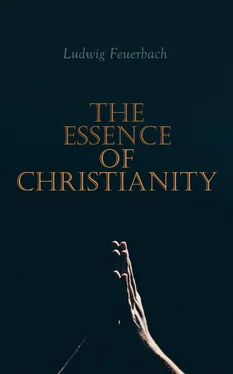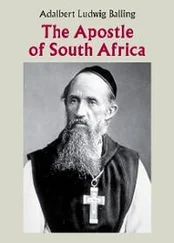The notion that the fulfilment of prayer has been determined from eternity, that it was originally included in the plan of creation, is the empty, absurd fiction of a mechanical mode of thought, which is in absolute contradiction with the nature of religion. “We need,” says Lavater somewhere, and quite correctly according to the religious sentiment, “an arbitrary God.” Besides, even according to this fiction, God is just as much a being determined by man, as in the real, present fulfilment consequent on the power of prayer; the only difference is, that the contradiction with the unchangeableness and unconditionedness of God—that which constitutes the difficulty—is thrown back into the deceptive distance of the past or of eternity. Whether God decides on the fulfilment of my prayer now, on the immediate occasion of my offering it, or whether he did decide on it long ago, is fundamentally the same thing.
It is the greatest inconsequence to reject the idea of a God who can be determined by prayer, that is, by the force of feeling, as an unworthy anthropomorphic idea. If we once believe in a being who is an object of veneration, an object of prayer, an object of affection, who is providential, who takes care of man,—in a Providence, which is not conceivable without love,—in a being, therefore, who is loving, whose motive of action is love; we also believe in a being, who has, if not an anatomical, yet a psychical human heart. The religious mind, as has been said, places everything in God, excepting that alone which it despises. The Christians certainly gave their God no attributes which contradicted their own moral ideas, but they gave him without hesitation, and of necessity, the emotions of love, of compassion. And the love which the religious mind places in God is not an illusory, imaginary love, but a real, true love. God is loved and loves again; the divine love is only human love made objective, affirming itself. In God love is absorbed in itself as its own ultimate truth.
It may be objected to the import here assigned to the Incarnation, that the Christian Incarnation is altogether peculiar, that at least it is different (which is quite true in certain respects, as will hereafter be apparent) from the incarnations of the heathen deities, whether Greek or Indian. These latter are mere products of men or deified men; but in Christianity is given the idea of the true God; here the union of the divine nature with the human is first significant and “speculative.” Jupiter transforms himself into a bull; the heathen incarnations are mere fancies. In paganism there is no more in the nature of God than in his incarnate manifestation; in Christianity, on the contrary, it is God, a separate, superhuman being, who appears as man. But this objection is refuted by the remark already made, that even the premiss of the Christian Incarnation contains the human nature. God loves man; moreover God has a Son; God is a father; the relations of humanity are not excluded from God; the human is not remote from God, not unknown to him. Thus here also there is nothing more in the nature of God than in the incarnate manifestation of God. In the Incarnation religion only confesses, what in reflection on itself, as theology, it will not admit; namely, that God is an altogether human being. The Incarnation, the mystery of the “God-man,” is therefore no mysterious composition of contraries, no synthetic fact, as it is regarded by the speculative religious philosophy, which has a particular delight in contradiction; it is an analytic fact,—a human word with a human meaning. If there be a contradiction here, it lies before the incarnation and out of it; in the union of providence, of love, with deity; for if this love is a real love, it is not essentially different from our love,—there are only our limitations to be abstracted from it; and thus the Incarnation is only the strongest, deepest, most palpable, open-hearted expression of this providence, this love. Love knows not how to make its object happier than by rejoicing it with its personal presence, by letting itself be seen. To see the invisible benefactor face to face is the most ardent desire of love. To see is a divine act. Happiness lies in the mere sight of the beloved one. The glance is the certainty of love. And the Incarnation has no other significance, no other effect, than the indubitable certitude of the love of God to man. Love remains, but the Incarnation upon the earth passes away: the appearance was limited by time and place, accessible to few; but the essence, the nature which was manifested, is eternal and universal. We can no longer believe in the manifestation for its own sake, but only for the sake of the thing manifested; for to us there remains no immediate presence but that of love.
The clearest, most irrefragable proof that man in religion contemplates himself as the object of the Divine Being, as the end of the divine activity, that thus in religion he has relation only to his own nature, only to himself,—the clearest, most irrefragable proof of this is the love of God to man, the basis and central point of religion. God, for the sake of man, empties himself of his Godhead, lays aside his Godhead. Herein lies the elevating influence of the Incarnation; the highest, the perfect being humiliates, lowers himself for the sake of man. Hence in God I learn to estimate my own nature; I have value in the sight of God; the divine significance of my nature is become evident to me. How can the worth of man be more strongly expressed than when God, for man’s sake, becomes a man, when man is the end, the object of the divine love? The love of God to man is an essential condition of the Divine Being: God is a God who loves me—who loves man in general. Here lies the emphasis, the fundamental feeling of religion. The love of God makes me loving; the love of God to man is the cause of man’s love to God; the divine love causes, awakens human love. “We love God because he first loved us.” What, then, is it that I love in God? Love: love to man. But when I love and worship the love with which God loves man, do I not love man; is not my love of God, though indirectly, love of man? If God loves man, is not man, then, the very substance of God? That which I love, is it not my inmost being? Have I a heart when I do not love? No! love only is the heart of man. But what is love without the thing loved? Thus what I love is my heart, the substance of my being, my nature. Why does man grieve, why does he lose pleasure in life when he has lost the beloved object? Why? because with the beloved object he has lost his heart, the activity of his affections, the principle of life. Thus if God loves man, man is the heart of God—the welfare of man his deepest anxiety. If man, then, is the object of God, is not man, in God, an object to himself? is not the content of the divine nature the human nature? If God is love, is not the essential content of this love man? Is not the love of God to man—the basis and central point of religion—the love of man to himself made an object, contemplated as the highest objective truth, as the highest being to man? Is not then the proposition, “God loves man” an orientalism (religion is essentially oriental), which in plain speech means, the highest is the love of man?
The truth to which, by means of analysis, we have here reduced the mystery of the Incarnation, has also been recognised even in the religious consciousness. Thus Luther, for example, says, “He who can truly conceive such a thing (namely, the incarnation of God) in his heart, should, for the sake of the flesh and blood which sits at the right hand of God, bear love to all flesh and blood here upon the earth, and never more be able to be angry with any man. The gentle manhood of Christ our God should at a glance fill all hearts with joy, so that never more could an angry, unfriendly thought come therein—yea, every man ought, out of great joy, to be tender to his fellow-man for the sake of that our flesh and blood.” “This is a fact which should move us to great joy and blissful hope that we are thus honoured above all creatures, even above the angels, so that we can with truth boast, My own flesh and blood sits at the right hand of God and reigns over all. Such honour has no creature, not even an angel. This ought to be a furnace that should melt us all into one heart, and should create such a fervour in us men that we should heartily love each other.” But that which in the truth of religion is the essence of the fable, the chief thing, is to the religious consciousness only the moral of the fable, a collateral thing.
Читать дальше












